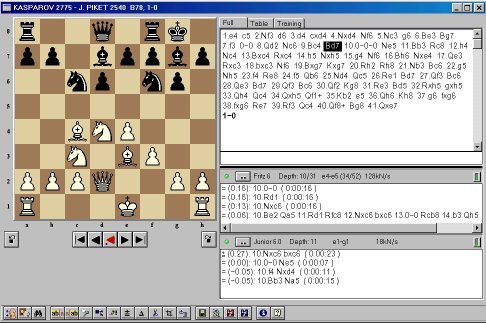 |
ChessBase Reviews |
Last updated 25 June 2000

| index | part 1 | part 2 | part 3 | part 4 |
ChessBase 7 Part 1
There were times when most correspondence chess players were happy with only a few books and the occasional magazine to help them prepare for their games. Times changed and players began to look for ever more sophisticated means of ensuring they were up to date with the latest theory. Computerised databases such as ChessBase soon appeared to help the hard-pressed correspondence player. Its speed in handling large games databases soon made it a must for any serious player.
The developers have constantly sought to improve on the program's performance over the years and the latest incarnation currently available is ChessBase 7.0.
The main attribute of any computer software is its ease of operation for the user who generally doesn't want to spend hours learning how to do simple tasks. ChessBase 7.0 gets top marks in this department. Being a Windows-based program everything is done by simply clicking the mouse and the developers improved on previous versions by including one click access to the latest features.
Speed of operation is probably the next most important factor. The promotional literature boasts an improvement in speed by up to 100 times in some important functions. Certainly I found the speed impressive and was able to find the relative games from a million plus database in under a minute, and that was only using a P166. What has to be borne in mind however is that speed claims should not be taken at face value as the hardware on your PC is what determines how fast you get things done. For example, the developers claim removal of 30,000 doubles from a 900,000 database in 18½ minutes on a P233. More like 3 to 4 hours on my machine, but as this is the sort of operation you only do occasionally that hardly seems to matter. What matters to me is being able to find suitable games to help me prepare and study the lines I am following in my own correspondence games. ChessBase 7.0 performs this task perfectly.
Now for a look at some of the impressive new tools available that I particularly liked. My favourite has to be what the developers have called the opening report.
This allows the user to get a report based on the current game position from the games available in the reference database. By right clicking on the game board and selecting Opening Report the program searches through the entire database for games where that position has occurred.

 The report generated from this information is impressive.
Information produced includes historical development of the line, its popularity over the years,
lists of strong Grandmasters and other notable players who have used that line and the critical
lines and main plans. Any of the players games highlighted in the report can be instantly accessed
and viewed by mouse selection from the report.
The report generated from this information is impressive.
Information produced includes historical development of the line, its popularity over the years,
lists of strong Grandmasters and other notable players who have used that line and the critical
lines and main plans. Any of the players games highlighted in the report can be instantly accessed
and viewed by mouse selection from the report.
The critical lines and main plans are ideal for learning the opening, under investigation, with information on what is normally played and the expected replies. All of this is of course dependent on the quality of your database, but as ChessBase 7.0 comes complete with its own database this won't be a problem.




One of the first questions I asked myself was is the information on these lines really any better than I would find in a good book. I decided it was. Authors' views are always subjective and they will generally only include lines which they consider relevant. ChessBase simply considers all the games played and therefore probably gives a more accurate overall picture. Books quickly become out of date whereas if you frequently add new games to your database your opening report will guide you with up to date information.
ChessBase 7.0's Repertoire management allows you to build and maintain a database on your own choice of openings. As new games are added to your collection these are scanned to see if any are relevant to your opening repertoire and, if they are, they are added to the repertoire database. This facility is a good idea since it saves you the time in having to sift through any large new database you buy just to find games relevant to your own opening preferences.
The new position tree is also a pretty useful tool and is similar to the openings books you can get for Fritz5. From a particular position you get a list of moves available, percentage score, average ELO and performance. This allows players, at a glance, to determine which lines may be good or bad for your side. Careful selection can then allow you to better utilise your time in analysing the appropriate lines. All too often players waste time analysing lines which are irrelevant, and the use of the position tree should cut down on this waste of time. Correspondence players with a large number of games and limited study time will find this facility invaluable.
As I mentioned earlier all of these valuable tools depend on having a good up to date database. This program takes this into account by allowing you to automatically download the latest games from the Internet free of charge. Games are downloaded from Mark Crowther's site TWIC which means you have instant access to the latest games played by the world's strongest players. The program also allows you to freely download any enhancements which the developers have come up with since you bought your copy of the program. Such after sales service has got to be a major selling point for any software.

ChessBase 7.0 also allows the use of multiple analysis engines, any of which can be locked on a particular position in a game whilst you merrily explore the rest of its moves and variations. You can return to the analysis position later and see what the module has come up with whilst working in the background. In fact, you can have a second or third analysis module switched on as you play through the other moves to see what might have been played at each point in the game.
There are many other subtle improvement which could be mentioned, but the main question is would I recommend ChessBase 7.0 to serious players. The answer is an emphatic yes. The program simply offers the best method for improving your play to date. You still have to put in the work but this will take out a lot of the pain involved. One piece of advice though is to shop around. Traders can be competitive and as a result give special offers at different times. Phone around for the best price. A few pounds in phone calls could save you £50 on the purchase price.